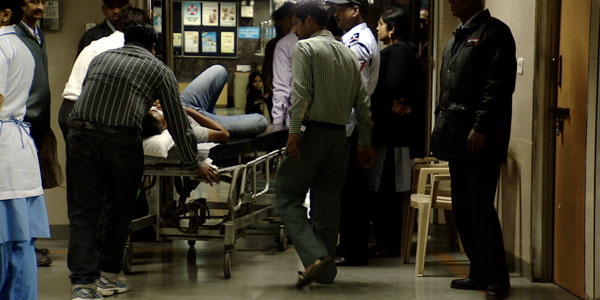
Every 60 minutes, 15 persons die in traffic accidents in India. According to the Law Commission of India, at least 50% of fatalities can be prevented if road accident victims receive medical attention within the critical first hour after the accident. However, a 2006 study conducted by the Indian Journal of Surgery shows that 80% of victims in India do not receive emergency medical care within that Golden Hour.
Time and again, road accident victims spoke to us about how no bystander came forward to help them. When Sukhdev Prasad, a casual driver with Air India, and his friend, were hit by a BEST bus in Mumbai in 2013, it was broad daylight. “For 25 minutes we lay there crying for help. A large audience gathered but no one came forward,” says Prasad who suffered severe injuries and is still bedridden.
Such injuries and fatalities can be prevented if bystanders lent a helping hand. Devendra Kumar Dubey, a resident of Delhi, was riding a cycle when he was hit by a speeding autorickshaw. Such was the impact that his cycle was thrown away and he was flung to the ground. The driver fled the scene, leaving the autorickshaw behind. Three school boys saw this and when no one listened to their pleas for help, they hoisted Mr Dubey in the auto and pushed it to a nearby hospital. Thanks to this timely intervention, doctors were able to heal his severely damaged leg.
Why do people hesitate to come forward and lend a hand? A 2013 survey conducted by SaveLIFE Foundation, an NGO focused on improving road safety and emergency care in India, shows that 74% bystanders are unlikely to assist a seriously injured person on the road, irrespective of whether they are alone at the spot or in the presence of others. The study, conducted across seven cities, Delhi, Hyderabad, Kanpur, Mumbai, Indore, Ludhiana and Kolkata, also offers some insight into why bystanders fail to come forward to assist.
*88% of bystanders who were unlikely to assist cited legal hassles like police questioning and court appearances as a deterring factor.
*74% said they would be more inclined to step forward and help if the accident occurred in a familiar environment as they were more confident of receiving help and support.
*77% of those unlikely to assist said lack of cooperation from hospitals is also a reason.
*88% expressed the need for a Good Samaritan Law that will create a supportive environment for bystanders to assist road accident victims.
However, currently in India there is no such law that offers protection to those who come forward to help accident victims. Research by SaveLIFE Foundation highlights initiatives taken worldwide in this regard. For instance, in the state of Vermont in U.S.A., and in countries like France, there is an obligation on a person to provide assistance to an injured party, if such person can do so without danger or peril to any other person. Countries which do not impose such an obligation, like England, Wales and China, provide civil and/or criminal liability protection for any person that provides assistance to an injured party, provided certain statutory requirements are met.
In India too, interestingly, the demand for this legislation was voiced most strongly by people in the lower socio-economic strata, with 95% demanding protection from arbitrary police harassment.
India has the largest number of road-related deaths in the world. The Good Samaritan Law can go a long way to address this crisis and help ensure that hundreds of lives are not lost for reasons that are completely preventable.
Sign NGO SaveLIFE Foundation's petition to the Health Minister to introduce a Good Samaritan Law by clicking here.